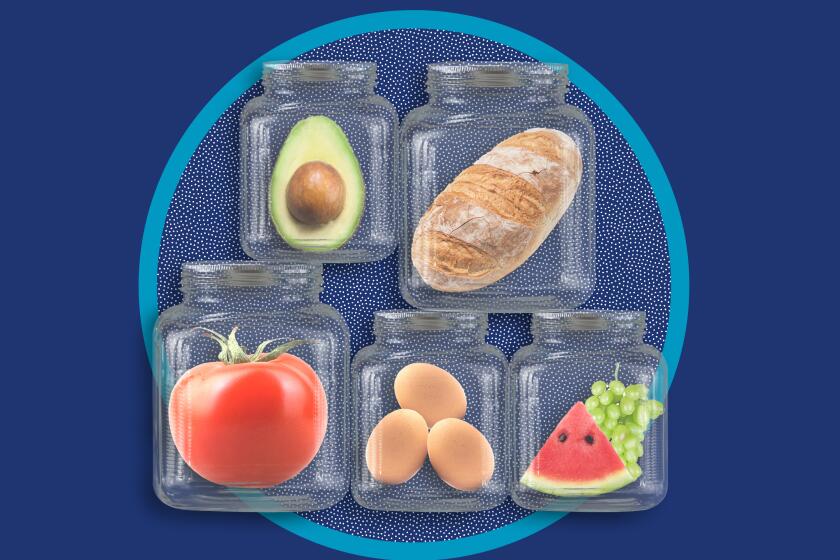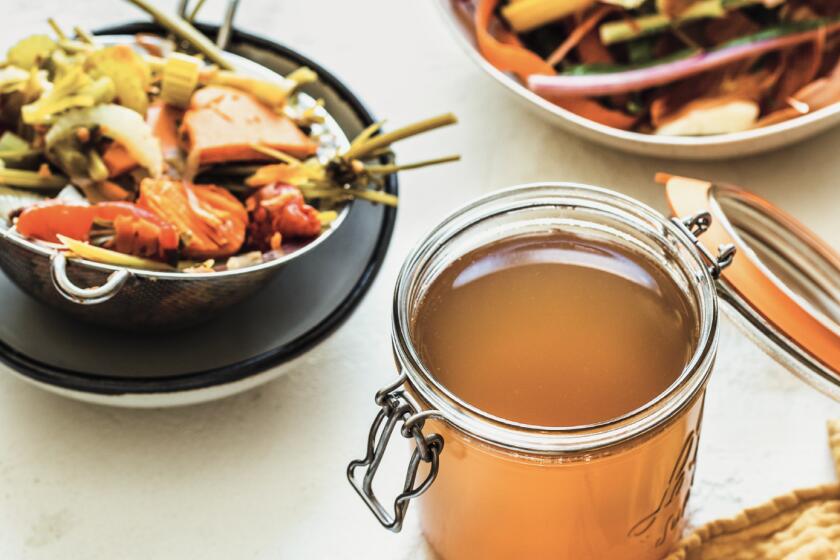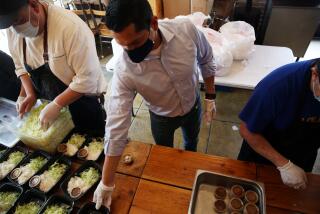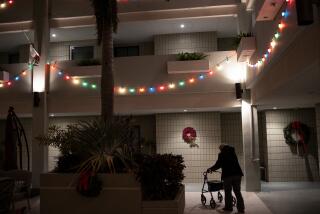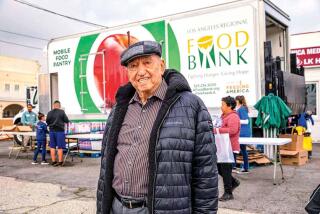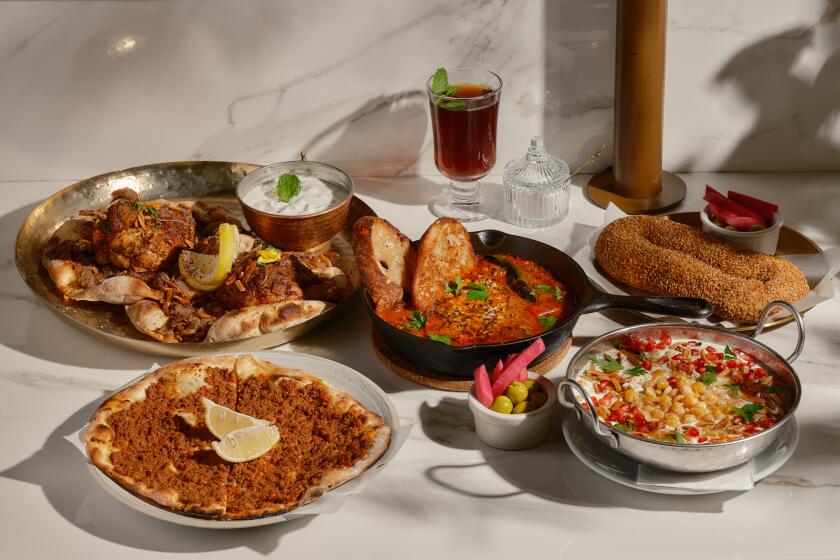How Angelenos are battling food insecurity by using hyperlocal apps to share their bounty
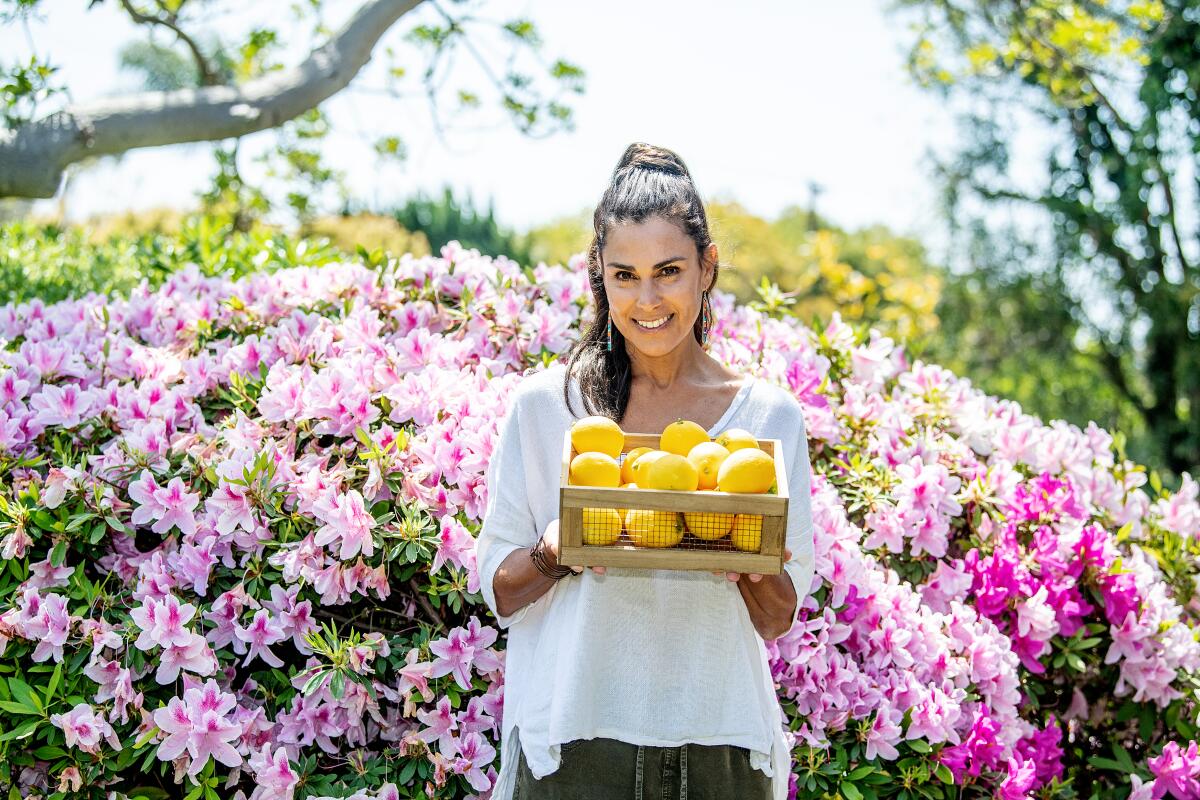
When Erica Levi, a disabled single mom, received a 12-pound sirloin roast from the Upward Bound House in Santa Monica for Hanukkah, she knew she would have leftovers after she served it to her family of four. Concerned about spoilage, she knew she had to act quickly.
By posting on two Facebook gift economy groups, Buy Nothing Santa Monica (with about 1,400 members) and Ask, Borrow, Give — Santa Monica (2,462 members), Levi quickly found nine neighbors with whom she could share the meat.
But she wanted to do more — to donate full meals — so she bought a chocolate cake, steamed some edamame, roasted potatoes and purchased dinner rolls to accompany the roast. The mother of three delivered the hot, foil-wrapped plates to several neighbors’ doorsteps, while beneficiaries picked up the rest from Levi’s Santa Monica home.
“I love being able to share with others in need of supplementation to their normal groceries,” she said. “It was a wonderful lesson I got to teach my children as well — that giving is a beautiful gift. When you have an abundance of something, it is always better to share with others, even if it’s just a roast.”
Levi said these Facebook groups were her introduction to the online gift economy — an informal system of giving without the expectation of receiving anything in return.
“At first, I was wishy-washy about using these groups to gift, but they allow you to still have that connection with people,” she said. “I’m immuno-suppressed, so I had to take that leap of being online and found it was still possible to make that human connection and make it well.”
Levi, who regularly shares food she receives from Upward Bound House, a nonprofit that provides housing and other services to families with children, said the interactions have helped her form friendships with members of the very active Ask, Borrow, Give — Santa Monica group.
“I talk to several of the women, sometimes daily, either via Messenger or we call each other,” she said. “To hear from someone who says, ‘If you need an ear or you need help, I’m here,’ I never expected that.”
With so many unemployed and struggling to make ends meet right now, I’ve noticed an uptick in our group of foraging, trading and giving.
— Bat Vardeh
Although food insecurity has increased during the pandemic, the United States remains a country that can’t seem to deal with high rates of food waste. The U.S. Department of Agriculture in 2010 estimated that 30% to 40% of the consumer food supply, around 133 billion pounds and $161 billion of food, is wasted every year. In 2015, the agency set a goal with the U.S. Environmental Protection Agency to reduce nationwide food waste by 50% by 2030, and the EPA has created the Excess Food Opportunities Map to help users divert their food waste from landfills to food banks, anaerobic digestion sites and composting sites.
On a hyperlocal level, apps and online groups are popping up that share the goal of getting food to those who need it most. That need shows no signs of abating. Although the U.S. economy added 916,000 jobs in March and the unemployment rate dropped to 6% from 6.2% percent in February, officials estimate it will take months — or years — to return to pre-pandemic levels.
Bat Vardeh, the Los Angeles-based founder of the 530-member Facebook group Foraging and Mushroom Hunting Women of SoCal, says she has seen an increase in food changing hands since the pandemic began.
“With so many unemployed and struggling to make ends meet right now, I’ve noticed an uptick in our group of foraging, trading and giving,” said Vardeh, who facilitates donations to the Valley Food Bank by contacting Glendale and Claremont fruit tree owners who support gleaning. “Resourcefulness has become a means of survival for Angelenos, because you have to be resourceful if you’re going to survive on unemployment.”
Members of the Facebook group share tips and recommend other resources like the worldwide gleaning map Falling Fruit. They also post gifts or trades like kumquat and plum syrup, guavas, grapefruit and passion fruit, as well as teach one another foraging skills.
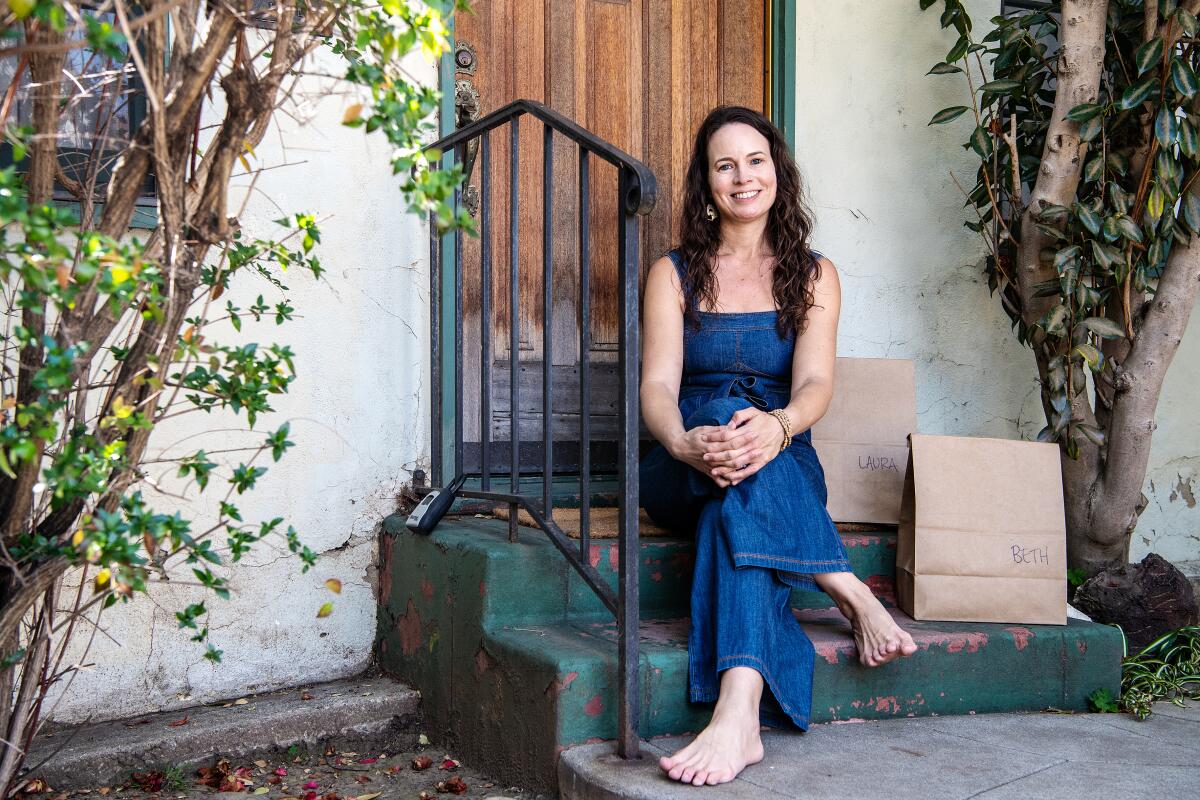
For many who have had to cook meals at home over the last year, a gift of prepared foods is sometimes more helpful than produce. Meredith Klein, a private chef living in Santa Monica, was catering for a tech company when the pandemic began. Company officials, with no events in need of catering, asked Klein if they could continue to pay her to donate prepared foods to those in need in her community. Klein offered to prepare and deliver hot meals via her Ask, Borrow, Give — Santa Monica Facebook group, and she received many takers for dishes such as dal makhani; tomato and white bean soup; and Thai red curry sweet potato soup.
“A lot of people I have gifted food to live alone, and they’ve been eating their own cooking for months or weeks on end, so just to have a break in cooking is a real gift for them,” Klein said. “It’s not sustainable for us to all be cooking every night, every meal, and we’re wired to each other to prepare food communally and eat food communally. It’s interesting at this time when we’re so distanced from one another that we’re actually using food more as a medium for connection, and this is not something that’s going to go away after the pandemic.”
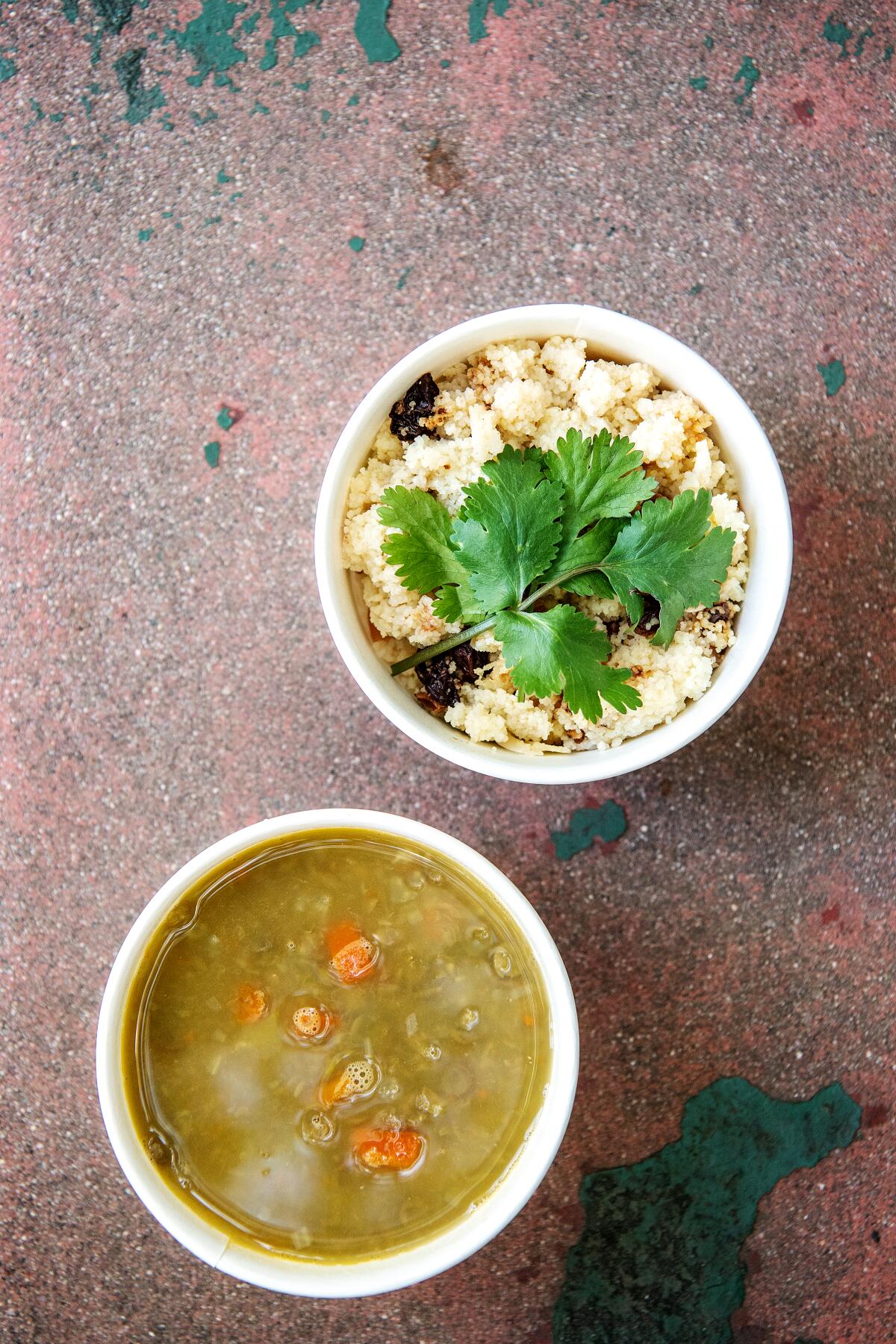
After Stephanie Vazquez’s husband was furloughed from his job as executive chef at the downtown Los Angeles restaurant Best Girl, the El Sereno bookkeeper and mom found herself with $700 worth of donated produce from the hotel’s kitchen — including butternut squash, butter lettuce, lemons, limes and onions — that her family couldn’t eat in a timely manner. Vazquez, who often posts offers on NextDoor of everything from persimmons to frozen pizzas for free pickup, created a posting on the app Dec. 13. She says that from 7 a.m. to 9 p.m. the next day, more than a dozen neighbors picked up food.
“It was gone in one day, but I had messages three days later from people who wanted to know if I had any food left,” Vazquez said. “Ninety percent of the stories from neighbors were, ‘Oh, my husband just got laid off because of COVID, and he was the breadwinner, so we’re trying to figure out things financially.’”
The problem of food waste has some solutions. Start by being smart about shopping and storing.
Vazquez, whose husband was laid off at the end of his furlough, was grateful to be able to share the food with neighbors facing the same economic struggles as her own family. “I felt such a strong bond with my neighbors from me doing this,” she said. “Even though we don’t have a lot, I felt really good, because it was going back into the community.”
Community is one of the forces that drives Olio and Galora, two apps that cater specifically to the food economy.
Olio, founded in 2015 in London by Stanford Graduate School of Business graduates Tessa Clarke and Saasha Celestial-One, has found an audience in Los Angeles, with 8,000 users across the city. There are 175,000 members in the United States and more than 3.5 million worldwide; all together, they have shared more than 18 million portions of food in 59 countries since Olio started.
Swantje Willms, who lives in Pasadena, says Olio has allowed her to donate food to people nearby, since she doesn’t drive and can’t drop off heavy groceries at a donation site. From her stoop, neighbors have picked up everything from loaves of bread given as a bonus while shopping at Pavilions to near-expiration-date canned fruit and vegetables purchased for her emergency kit.
The pandemic has had an outsize effect on Olio’s growth, Clarke says. The volume of Olio listings quintupled from December 2019 to December 2020, with all pickups contactless to be pandemic-safe.
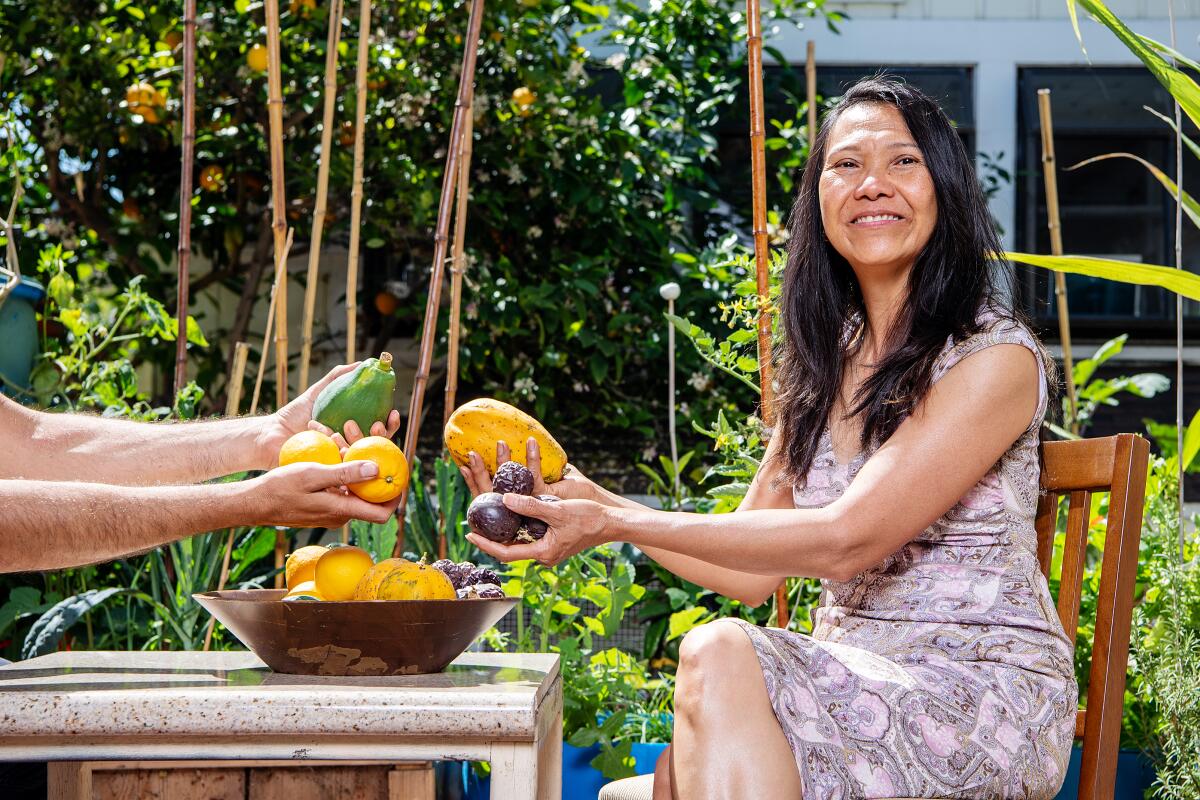
Galora, a food-sharing mobile app created last year in Los Angeles by Ryan Xavier and Chris Chin, owes its genesis to the pandemic. When Xavier’s firm, vacation rental company Cobblestone Paris Rentals, lost nearly all its business in March 2020 because of travel bans, he turned to his kitchen and garden more for solace than as a potential career. “I started baking bread and planted a garden and was inspired to share the abundance from that backyard,” said Xavier, a native Angeleno and Chinatown resident, adding that the garden already had four lemon trees, two pomegranates, a loquat and a “monstrous and over-productive persimmon tree.”
In the early days of the pandemic, while walking around his neighborhood, Xavier wondered how the avocados and citrus he saw on neighbors’ trees, as well as the bread he smelled baking in their houses, could be shared with others who were struggling to put food on the table.
“We essentially live in an orchard in Los Angeles,” Xavier said. “The city is built upon former citrus and avocado fields, and many of those trees are still there, behind fences and garages and in backyards just out of reach of the general community. It’s clear that some neighbors have far too much for one family to eat, but how do you make that contact? … We have a sense of privacy and private property. … We have these preexisting barriers and need a way that’s socially acceptable to share.”
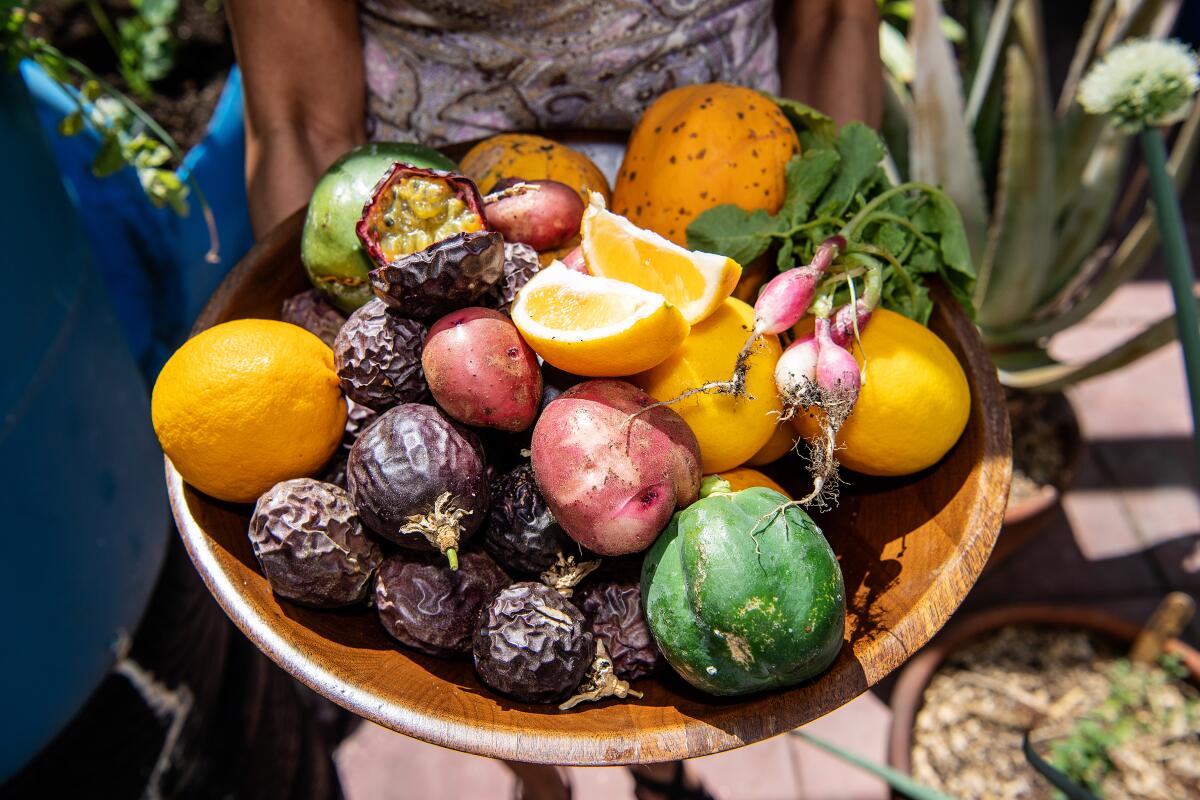
In May, Xavier decided to create what he hoped would be a solution to the sharing issue. He circulated a one-page questionnaire via Facebook and NextDoor, asking potential users what produce they grew and whether they were interested in trading, sharing or making community connections. People also were asked whether they preferred a contactless trade, one-on-one trades, self-picking farmstands on their property or for Galora to handle distribution.
By July, he had developed his app, which allows local residents to share food and produce with one another, with an option to sell as well — usually at lower-than-grocery-store prices. Xavier says Galora users started sharing prepared foods as well.
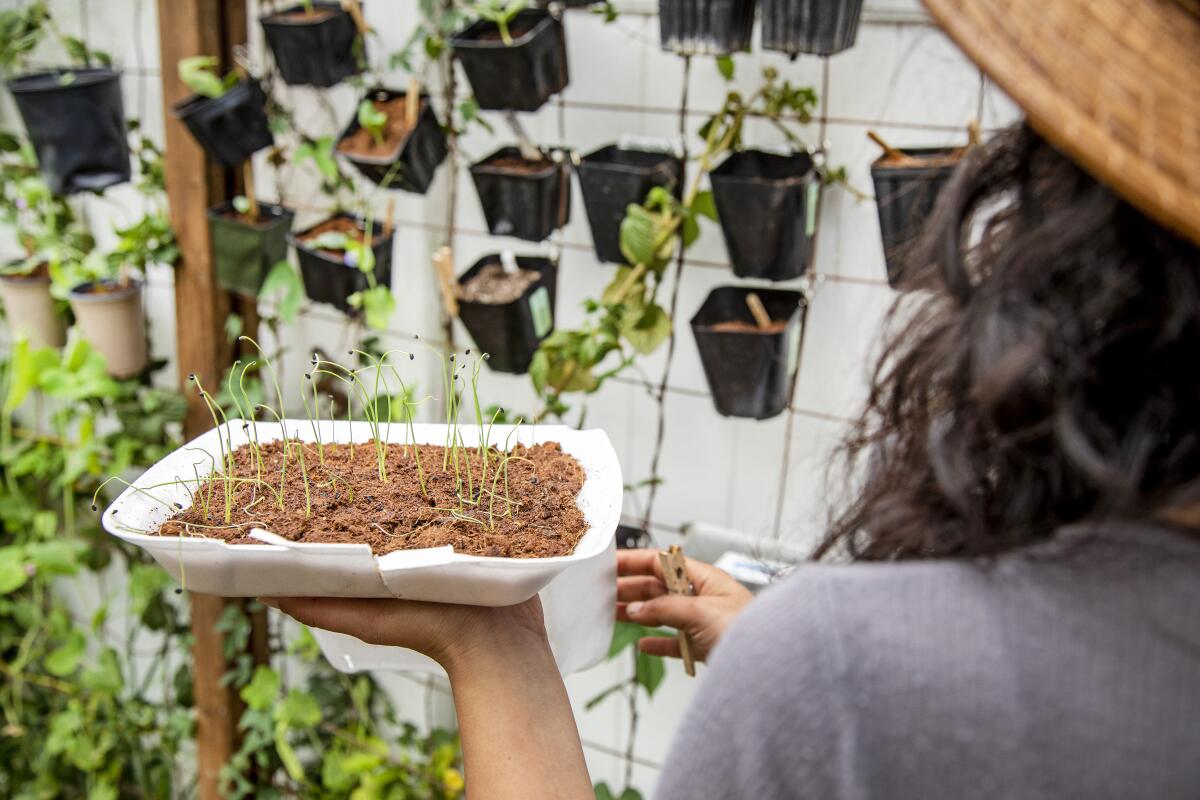
“We had more than a thousand people sign up in three weeks,” Xavier said. “It’s been a passion project for us to see people posting their fruits and vegetables, home-baked bread, lumpia, chilaquiles, empanadas from Argentina, tiramisu, focaccia, Indian food, Indonesian food.”
If a member doesn’t have extra food supplies, he or she will often assist with fruit picking, preserving, dehydrating or baking, Xavier said. After helping out, the member will keep some persimmon bread or dried fruit or jam and give the rest to neighbors and the fruit tree owner.
“People need to rethink and reevaluate their place in their community, because often they have a skill to contribute,” Xavier said. “We live in an abundant, multitalented community in Los Angeles.”
Xavier sees the food gift economy not only as a way to alleviate loneliness and financial shortages during the pandemic but also as a progressive movement toward rediscovering community.
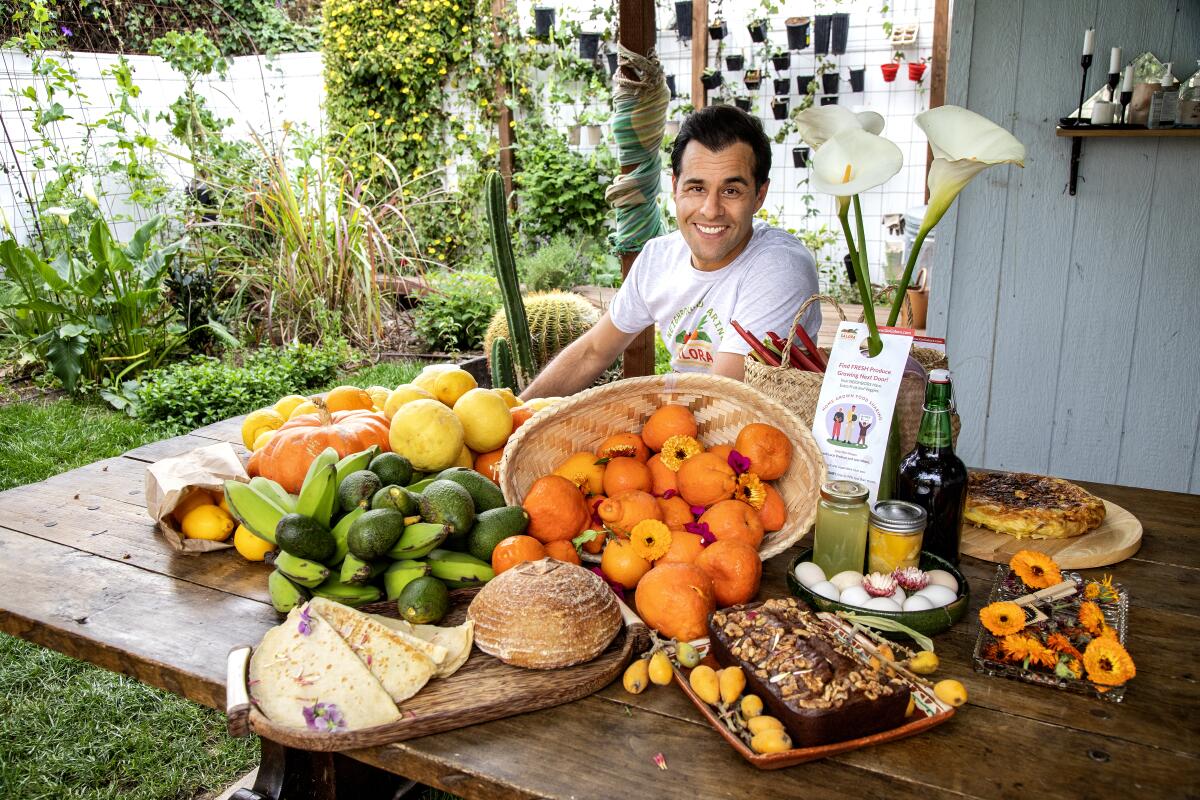
“Our members are creating a return to a societal interaction that existed for millennia but has disappeared in modern cities by virtue of private property, a focus on long workdays and commutes, and the isolation of the nuclear family,” Xavier said. “Human beings are social creatures, and a lot of people didn’t really realize the negative impact of this many months of not going into work, of not having a friend circle.”
Xavier also created a mentorship program within Galora, where members can teach one another a skill, whether it’s cooking, foreign-language conversation, ukulele lessons, Lamaze breathing or yoga. Users of the app can access videos with foraging guides, gardening tips and cooking lessons.
Culver City videographer and pastry chef Alexandra Dorros used Galora to make an exchange that many would consider unusual: swapping her avocados for a neighbor’s rabbit feces. Dorros is an avid gardener who uses the rabbit droppings for the compost that fertilizes her 20 fruit trees. Dorros also gives away heirloom tomatoes, cucumbers, cauliflowers and golden sapotes (a rare fruit that bruises easily and is seldom found in grocery stores) on Galora, and a neighbor she met through the app leaves other types of fruit on her doorstep. During passion fruit season, Dorros donates some of the produce to Nourish L.A., a charity group she found through Galora, and gives away and trades both passion fruit and passion fruit ice cream to neighbors.
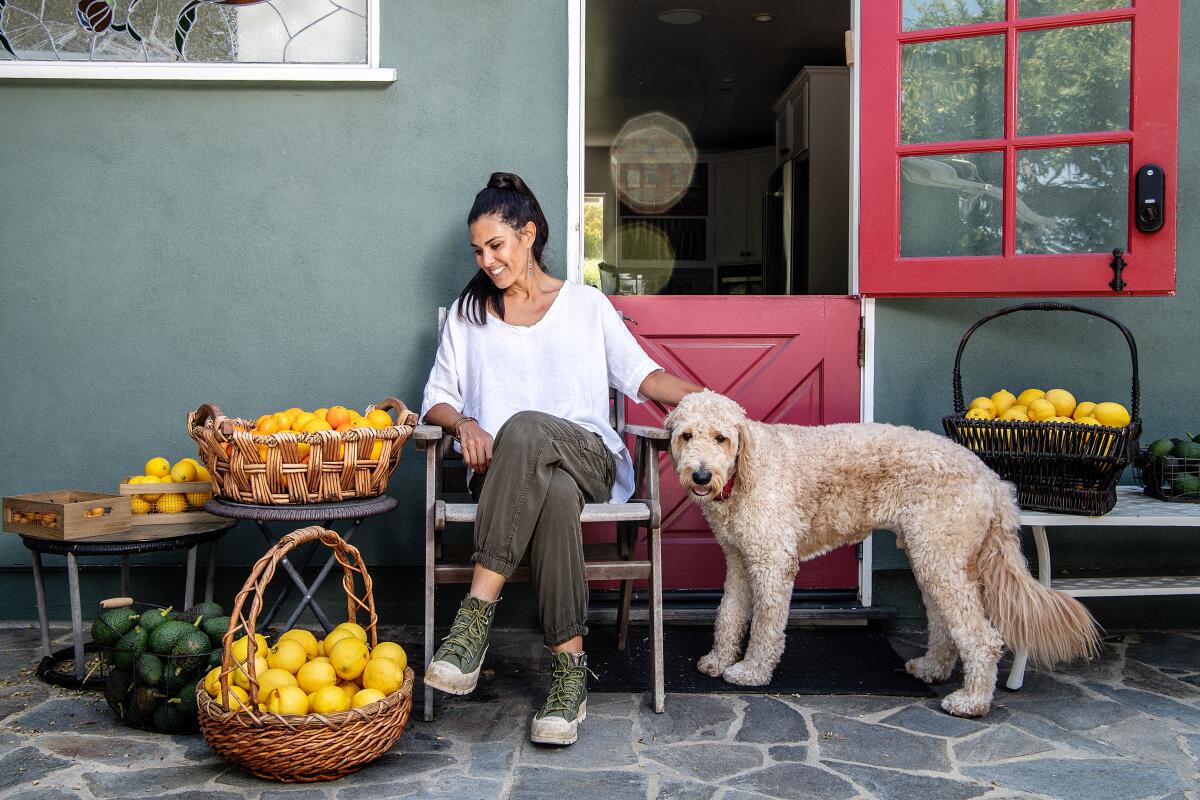
“With the pandemic, things have changed a lot, and you value your neighbor more, and food more,” Dorros said. “There is definitely a change of going back to basics. Food you’ve grown is even more valuable than going to the supermarket and getting something with pesticides. It’s a little extra love.”
For nurse and Glendale resident Thuy Tran, using Galora to give away produce like moringa leaves, goji berries and passion fruit from her 7,000-square-foot backyard has changed how she feels about the city. “I always thought the city was so selfish,” Tran says. “When I joined Galora, my passion fruit were already growing, so I offered them to people, and they were so excited, and they wanted to know how to grow them, and I even donated my moringa superfood smoothies. ... Now, I don’t think the city is so bad.”
Vegetable Scraps Broth
More to Read
Eat your way across L.A.
Get our weekly Tasting Notes newsletter for reviews, news and more.
You may occasionally receive promotional content from the Los Angeles Times.
